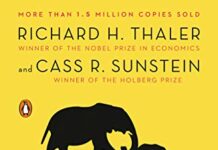
Ebook Info
- Published: 1994
- Number of pages: 389 pages
- Format: PDF
- File Size: 2.67 MB
- Authors: Richard H. Thaler
Description
Standard economics theory is built on the assumption that human beings act rationally in their own self interest. But if rationality is such a reliable factor, why do economic models so often fail to predict market behavior accurately? According to Richard Thaler, the shortcomings of the standard approach arise from its failure to take into account systematic mental biases that color all human judgments and decisions.
User’s Reviews
Editorial Reviews: About the Author RICHARD H. THALER is Henrietta Johnson Louis Professor of Economics, and director of the Center for Behavioral Economics and Decision Research, Johnson Graduate School of Management, Cornell University.
Reviews from Amazon users which were colected at the time this book was published on the website:
⭐all good
⭐As with any model claiming predictive power, economics rests on a theory of human behavior-specifically, rational choice theory, which posits decisionmakers who are autonomous individuals who make rational choices that maximize their satisfactions. Critics of economics have long complained that rational choice is, at best, an incomplete account of human behavior. The traditional response to that criticism is that rationality is simply an abstraction developed as a useful model of predicting the behavior of large numbers of people and, as such, does not purport to describe real people embedded in a real social order. A theory is properly judged by its predictive power with respect to the phenomena it purports to explain, not by whether it is a valid description of an objective reality. Accordingly, the relevant question to ask about the assumptions of a theory is not whether they are descriptively realistic, for they never are, but whether they are sufficiently good approximations for the purpose in hand. Until quite recently, empirical research tended to confirm that the rational choice model of human behavior is a good first approximation of how large numbers of people are likely to behave in exchange transactions.Over the last 10-15 years, however, a new school of economic analysis has emerged that challenges the rational choice model precisely on its predictive power. Empirical and laboratory work by cognitive psychologists and experimental economists has identified a growing number of anomalies in which behavior appears to systematically depart from that predicted by rational choice. The extent to which behavioral economics calls into question more traditional modes of economic analysis remains sharply contested. At the very least, however, it seems clear that attention must be paid to the possibility that behavioral analysis sheds light on policy issues.Richard Thaler is one of the foremost behavioral economists. This volume collects many of his early studies of behavior that departs from the predictions of rational choice economics. As such, this volume is more of an anthology than a coherent whole–and reads like it. The lay reader should also be warned that “Quasi Rational Economics” is, at beast, only quasi-accessible. Unlike “Winner’s Curse,” which collects a (relatively) accessible a series of articles Thaler wrote for the Journal of Economic Perspectives, “QRE” collects his more technical literature. Yet, for those willing to tackle the math and technical analysis, it remains a useful introduction to the literature.
⭐Me gustó
⭐
Keywords
Free Download Quasi Rational Economics in PDF format
Quasi Rational Economics PDF Free Download
Download Quasi Rational Economics 1994 PDF Free
Quasi Rational Economics 1994 PDF Free Download
Download Quasi Rational Economics PDF
Free Download Ebook Quasi Rational Economics



